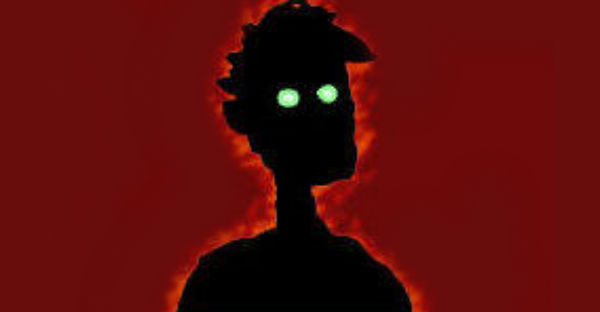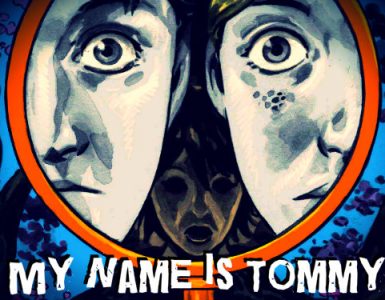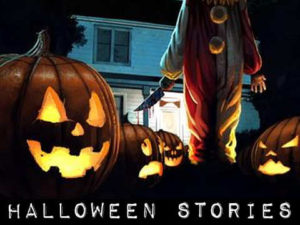Revenge is a classic tale of suspense by Samuel Blas. The story is about a man who comes home to find his wife has been attacked by an intruder. He vows to have his revenge. It was adapted for the first episode of the TV series Alfred Hitchcock Presents. It was also used as the plot for a number of stories in horror comics – “Revenge” in Witches Tales #21, “Honeymoon Horror” in The Tormented #2 and “Murder May Boomerang” in Crime Suspenstories #19.

Twilight is settling in the valley. Far below us pale lights are beginning to flicker and the spreading pattern of the city slowly comes alive. As the winding road narrows to the mountaintop the motor sound grows louder in the thin air, within the enclosing silence through which we move.
In the pale blue haze on my left the deepening dusk mingles with the vast silence that seems to suspend the day. A square yellow sign ahead blazes in our headlights: DANGER! SHARP CURVE AHEAD. The mountain wall leans close to the road. On Elsa’s side the low branches of a solitary tree rush by, scraping the top of the car.
Elsa, too, is part of the surrounding silence. Beside me she stares straight ahead at the highway. For a long time now she has not spoken; she neither smiles nor is sorrowful. Her expression is grave, almost serene, as if there were no such things as tears or laughter.
But this morning she smiled. A half day’s journey away, in the cool morning of a quiet glade she stepped from our trailer door and smiled softly as she waved me off to town. She blushed when I turned back a step to kiss her again. And when I finally drove off, the sweet touch of her hand still tingled in my palm.
Life was wonderful. I drove happily to the small town near by to buy provisions. We had decided to stay a few days more in this pleasant spot we had found. There could be no better place to finish out our honeymoon. As I neared the town I thought it would be fun to add a gift for Elsa to the stuff that I would carry back to the camp.
It was nearing lunchtime when I started back. I had piled groceries enough in the car to last us a week. While I waited for a traffic light to change, a newsboy came by. I bought a paper. It carried a headline reporting the capture of an escaped convict nearby. The subcaption said that his companion was still at large. “Presumed Hiding In the Woods Near Campbelltown.”
I ran quickly through the rest of the item. When the light turned I moved out fast and put on speed. Campbelltown was a place that lay beyond our camp, but too near to suit me, in the circumstances. I felt uneasy, with Elsa alone in the trailer. It was possible, of course, that the fugitive convict might be in our vicinity; but what disturbed me more was the thought that Elsa might have picked up the news on our radio. If she had, she would be frightened. I stepped on the accelerator.
The road twisted and turned around thinly wooded ridges and hills, and as I swung each curve I chided myself for leaving Elsa alone. I reminded myself that she had insisted I shop without her. “I have a surprise for dinner,” she had said with the only artfulness she knew—a shy, secret smile. My attention returned to the road.
The winding turns ended and the last stretch was a long, straight drive sheltered by a canopy of tall trees that somehow eased my anxiety. Not much further now. I imagined the way she would welcome me. She would staunchly deny that she had been afraid but she would hold my arm tightly. And then all of a sudden she would forget the whole thing. She would smile happily and tell me to close my eyes. How I loved that smile!
In the short while that I had known her and in the single month of our marriage I had grown to cherish that smile and the soft, rich laughter that sometimes accompanied it. So strange, that warm directness with which she shared my life, for in the presence of other men there was only shyness. I think that she was afraid of men. Something in her slender glowing warmth made their blood stir. She knew that, faintly, innocently. When the bold ones stared at her she would ask me to hold her close and never tell me why.
The sun was near high noon when the road broke out of the trees into the clearing. I rolled onto the grass and parked, feeling relieved because I had come so quickly. I pulled up the hand brake and looked to the trailer, expecting to see Elsa’s welcoming figure there. My complacency ended. There in the clear fall sunlight I saw wisps of smoke about our home, thin plumes slipping through the unlatched door.
Wild red leaves fluttered across the grass. And a wavering silence to which I listened stupidly. Then I ran to the door and swung it open violently.
An acrid fog swirled about me, making me choke and cough. A curling heavy mist clung to the ceiling. I swung the door wider and flailed my arms to clear the air. And as the fog lifted and shifted I saw with some relief that there was no fire. Our dinner was smoking and burning upon the stove. Three chops—I can see them yet—shriveled and black in a blackened frying pan; string beans in a burning pot, brown where the water had been; and in the oven, where I later found it, a crumbling burnt blob that must once have been Elsa’s first cake — the surprise she had promised me.
Panic got hold of me.
“Elsa!” I called.
There was no reply.
“Elsa!” I repeated. “Elsa!”
But only the crackle of the burning pot answered me, and outside a thin echo wandered in the woods. I shut off the burners. The crackling persisted as if in defiance, then it ceased. I turned uneasily toward the door that led to our dining alcove in the rear, stopping short at sight of the waiting table with its knives and forks and plates in neat array. But no Elsa. But of course. She wouldn’t, she couldn’t have been there or the dinner would not have burned.
Trying to understand what had happened I rejected a dozen answers at once. She would never have left the dinner, to bum for any sort of errand. Nor were there neighbors about with whom to fall into forgetful conversation. We were alone. Then as I stood there in the silence I suddenly heard that faint sound, a rising and falling as of someone weakly breathing. Behind the curtain that secluded our bed — Elsa!
I faced about and tore aside the curtain—
There she lay. Pale, still. I kneeled beside her. She was barely breathing.
“Elsa,” I whispered.
She seemed neither to move nor to make any sound, yet I knew she was breathing, for I had heard her. I rubbed her wrists and temples. I shook her gently, then fearfully. She stirred a little.
I wanted to get a doctor, yet I was afraid to leave. Then I remembered the brandy. I fumbled in the cupboard and my hand trembled as I poured a glassful and spooned a little between her lips.
At last it took effect. Her lips moved. Her expression altered, she sputtered, she coughed, and her eyes opened weakly.
At first they were blank. A long second passed while I held her hands tightly. Then, as if awareness had just touched her, horror filled her eyes and she moaned.
Then as I gathered her into my arms and let the sheet that covered her fall away, I saw that she was naked — completely.
There were bruises on her body, as if someone had beaten her: cruel bruises on her shoulders where callous fingers had pressed; angry marks where heavy fists had struck her.
Those numb moments beside my wife are not easily recalled, filled as they are with shame and a fierce anger. When at last she stirred again in my arms I held her tight and looked beyond her so that she would not see the anguish in my eyes. For long minutes she shivered; then she sobbed pitifully. Finally the tears and trembling stopped.
In a flat voice that frightened me she said, “He killed me… he killed me.”
How I gathered the tangled threads of those dreadful hours I cannot entirely remember. For a long time I cradled and comforted her, as though she were a child. After a while she seemed to respond. But then, when she shuddered again, my indignation mounted; I lost control and stormed at her with furious questions: “Who?” I demanded. “Who?” and “‘When?” and “How?” Until haltingly the brutal story came out. How a salesman knocked—
“A salesman?”
“Yes.”
“Are you sure? Did he carry a suitcase, a display?”
“Yes.”
A salesman. Then it was not the convict. Nothing reasonable. It was an ordinary man, ordinary.
How he knocked, interrupting her cooking; how he smiled patly and edged inside, eyeing her boldly while he chattered about kitchenware. How he touched her arm and seized her and how when she resisted he beat her and — and how she finally fainted away.
As she talked she seemed to fall under a spell of horror that produced in her a curious calm. She repeated, “He killed me, he killed me…” until I had to shake her to make her stop. Her eyes, I saw, stared straight ahead as she said over those dreadful words and it seemed as though she saw that man, that menacing figure, in the hopeless distance.
I never thought once of the police. Only one impulse was in me, a dreadful agonizing craving for revenge. “I’ll find him!” I swore. “I’ll kill him…”
Her hand clutched mine as if to restrain me, but when she felt the anger in my grip her mood abruptly changed and she said quietly, “Yes… yes.” And when I hesitantly asked whether she would come with me, help me find him, she nodded, almost eagerly I thought.
We drove to the outskirts of the town, where she listened carefully to my instructions, nodding with a sort of unearthly calm.
“We’ll drive slowly,” I told her. And this we did for perhaps a half hour, examining every passer-by as we moved back and forth through the unhurried streets. The sun still hung heavy above us as we turned a third time down the town’s main artery.
In the wide street were a few parked cars, and a thin afternoon crowd was lazily inspecting the shop windows. A man lounging near the hotel disinterestedly picked his teeth. It seemed to me he observed our slow progress curiously. I directed my wife’s attention to him but she gravely shook her head. Then suddenly she gripped my arm. Her lips fell open and her face paled. She pointed at a shabby car parked near the hotel. A man was locking the car door.
“That’s him!” she whispered.
My blood quickened.
“Are you sure?” I asked finally. Her eyes followed him as he put the keys in his pocket and turned toward the hotel “That’s him.” she insisted, “that’s him…”
I pulled to the curb in front of his car and stepped out quickly. “Wait here,” I said. “Don’t move—” I looked about me with assumed carelessness. The lounger, I saw, was facing the other way. No one else seemed to notice me. I sauntered into the lobby, a few steps behind my man. I decided to wait for him near the elevator, and sure enough he was soon standing beside me absently fingering his room key.
Luck was with me, for as the car went up I glimpsed his room number on the key in his hand. I had planned to get out with him and openly follow him to his room. Instead I rode to the floor above his, made my way to the stairway, down one level, through the hallways to his room and knocked softly, an unexpected and unknown visitor.
I was calm then as he answered my knock I spoke to him through the door and represented myself as the buyer for a local store. He opened the door wide.
“Why, come in,” he said; he wore a welcoming grin that infuriated me.
I went in; took the hammer from the waistband of my trousers and, as he turned to walk ahead of me, I smashed him mightily on the back of his head.
A great cry escaped him; then a dismal sigh that collapsed with him to the floor. He lay still.
I stared at the crumpled figure and my fury subsided, spent by that single avenging blow. A clock ticked into my consciousness. My eyes wandered absently to the simple dresser, the bed, the silent telephone. In my hand the hammer was edged with blood. I tucked it back in my trousers and dropped the skirt of my coat over it. With my handkerchief I turned the knob of the door. Curiosity prompted me to glance again at the still figure on the floor, but I no longer cared. It might be hours before anything happened. I might be suspected or I might not. None of these conjectures bothered me. I was reasonably safe from suspicion; that I knew; except perhaps from this — this ordinary individual.
I turned and went out quickly, closing the door behind me. And with that closed door behind me, in that quiet carpeted hallway, I at last felt clean, free of obsessing shame.
I went back upstairs, rang for the elevator and rode down quietly. The very sleepiness of this town made my ambling exit from the hotel unnoticeable. Elsa was still in the car, patient, gazing straight ahead, just as I had left her.
“It’s done,” I said.
Her head barely turned in my direction and she nodded slowly. She said one word: “Good.”
Poor Elsa. So altered with shame and shock that she had grown a shell which I could not pierce. She sat silently in the car while, back at our camp, I hooked up the trailer and made ready for a journey. Even the lunch I fixed for her she barely touched, nibbling once or twice, then staring into space. Perhaps when we were away from this terrible place…
It was evening when we stopped again. I drove furiously past a dozen small villages, hurrying toward the city that lies, now, below and behind us at the foot of the mountain. I hoped to find in its busy streets some distraction from our lonely secret, to lose some of this horror there, perhaps in some lively bar or in a theater; perhaps in a good night’s rest. Then the strain of the dreadful day took charge. A good night’s sleep was all I craved. But not in the trailer; not yet.
Elsa agreed indifferently. We rolled ahead and merged with the traffic in the city. We would park the trailer and stop at the best hotel. We would have a hot bath, then dinner in our room and perhaps a bottle of wine. And a good sleep, a good sleep… “Would you like that?” I asked her.
I thought her expression softened; certainly a tear glistened in her eye. I wanted right then to hold her in my arms, to caress her and comfort her. I pointed to a hotel we were approaching.
“Would you like that one?” I asked.
Her glance followed my pointing finger. She paled. She gripped my arm tightly and her lips parted. She stared straight ahead. Oh, God! She stared straight ahead and pointed at a man in the street—
“That’s him” she whispered. “That’s him…”







awesome